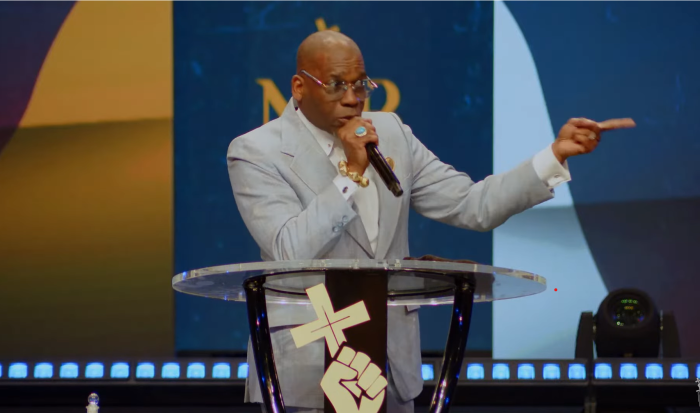
Outspoken activist megachurch pastor Jamal Bryant and leaders of the national Target boycott initiative are urging incoming Target CEO Michael Fiddelke to reinstate the retail giant’s diversity, equity, and inclusion policies or follow the trajectory of his predecessor, Brian Cornell.
The warning comes as many black consumers and their allies have avoided shopping at Target in response to the company scaling back its diversity, equity, and inclusion policies under Cornell’s leadership and his halting efforts to address the disagreement amid plummeting sales.
“Incoming Target CEO, Michael Fiddelke has an important choice,” Jaylani Hussein, co-founder of the national Target boycott and executive director of Council on American-Islamic Relations-Minnesota, whose parent organization is classified as a terror organization in the United Arab Emirates and faces calls to be labeled such in the United States, said in a statement to The Christian Post Wednesday.
“He can restore public trust by reversing these harmful DEI rollbacks — or continue down the failed path of Brian Cornell. If he chooses the latter, Target risks declining to a point of no return.”
In recent years, Target, its main competitor Walmart and several other large corporations have reevaluated their DEI policies in the aftermath of the U.S. Supreme Court’s 2023 ruling, which found that the admissions policies of the University of North Carolina and Harvard University that use race as a factor were unconstitutional. Additionally, the Trump administration has also pressured entities to drop DEI initiatives.
“Target took its most loyal customers for granted,” Nekima Levy Armstrong, a civil rights attorney, founder of the Racial Justice Network, and co-founder of the national Target boycott, said. “Instead of standing with communities that have supported them for decades, they chose profits over people — and it has cost them billions of dollars and millions of shoppers who have vowed not to return.”
In announcing the company’s leadership change on Wednesday, Target said in a statement that it is maintaining a forecast of a low-single digit decline in sales for fiscal year 2025.
“Net Sales of $25.2 billion in the second quarter were 0.9 percent lower than last year, reflecting a merchandise sales decrease of 1.2 percent, partially offset by a 14.2 percent increase in non-merchandise sales,” the company explained. “Comparable sales decreased 1.9 percent in the second quarter, reflecting a comparable store sales decline of 3.2 percent, partially offset by comparable digital sales growth of 4.3 percent.”

Cornell, who has served as Target’s CEO since 2014, will step down effective Feb. 1, 2026, when Fiddelke is also expected to take the helm of the retail giant. Cornell is expected to serve as executive chair of Target’s board of directors after he steps down as CEO.
Bryant, a prominent voice in the Target boycott effort and the leader of New Birth Missionary Baptist Church in Stonecrest, Georgia, told Capital B Atlanta that he was aware that Cornell was on the way out as early as Wednesday, but he was caught off guard by Wednesday’s announcement.
“At least six weeks ago, we knew that [Cornell] was going to be leaving at the end of the year, but we were not expecting an announcement to happen this soon,” he told the publication.
Beginning on March 5, Bryant and his church committed to what they called a 40-day fast from shopping at Target. The Georgia pastor accused the retail giant and other large corporations of capitulating to Trump’s push to end DEI policies that he says “undermine our national unity.”
Earlier this year, Bryant rejected an offer from Target to settle the dispute with a pledge from the company to invest $2 billion into black-owned businesses by July 31. Bryant, who called Target’s DEI rollback a “spit in the face of black people,” claimed to his congregants that their boycott had caused the share price of the company to tumble.
Target’s stock price is amid a years-long sharp decline that began around 2021, when the stock price reached a peak of around $260 per share and fell by over $100 per share within a year. The Target stock fell from around $173 per share in early 2023 to around $112 by November 2023. By April 2024, the stock price rose to around $170 per share. Over the next year and a half, the stock stayed around $145 to $160 per share.
In November 2024, the stock price fell from around $156 per share to around $120 per share in a matter of days. Since the start of 2025, the stock price has fallen almost 30% to $96 per share.
At the start of the year, Target announced that it would face an expected “meaningful” drop in its first quarter profits due to “ongoing consumer uncertainty,” soft sales in February and concerns about tariffs, CNBC reported at the time. Across the retail industry, sales were down more than expected to start 2025.
Although the sales drop impacted the retail industry, the stock price for one of Target’s largest competitors, Walmart, continues to grow and has seen a 30% rise over the last year and 8% increase since the start of 2025.
In June, Bryant accused Target of trying short-change the boycott efforts by making a $300,000 donation to America’s largest historically black denominations.
In addition to the demand that Target honors its $2 billion pledge to the black business community “through products, services, and black media buys,” Bryant’s Target Fast campaign also demanded the retailer deposit “250 million amongst any of our 23 black banks,” restore “the franchise commitment to DEI” and “pipeline community centers at 10 HBCU to teach retail business at every level.”
Bryant accused Target of trying to go around him to find partners who would, in his words, “sell out” the black community.
“You thought you was going to go around me and go to the National Baptist Convention and then sell out for $300,000. Are you crazy to think that we going to sell out for chump change? You must not know who we are. Our father is rich in houses and land,” Bryant declared.
Cornell also met with longtime African American civil rights leader Rev. Al Sharpton in April. Sharpton, who heads the National Action Network, called the meeting “constructive.”
Bryant told Capital B that he hopes Fiddelke will successfully negotiate an end to the Target boycott in the near future.
“We are going to try to meet with the new CEO … to share what our concerns are,” he said. “Prayerfully, [we’ll] have a resolve. Otherwise, we keep the fire burning and the boycott maintains.”
Contact: leonardo.blair@christianpost.com Follow Leonardo Blair on Twitter: @leoblair Follow Leonardo Blair on Facebook: LeoBlairChristianPost















